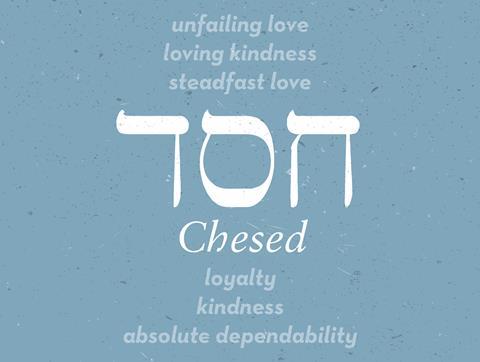Don’t miss the significance of this biblical title, says David Instone-Brewer. It reveals how God is absolutely dependable

I had an email recently from a friend asking me to urgently wire some money to him because he was in trouble. I didn’t do so, because I realised it was a scam. Few of us would fall for cons like this, but some of the criminals behind them think they’re on to a winner because they come from a culture where you help friends without thinking twice. People from these cultures can understand certain important concepts in the Bible better than we do, because they think more like those who lived in Old Testament times.
In the Old Testament, kinship was valued above everything. It wasn’t just that you wanted to help your family and wider community – you were obliged to. Helping your relatives was the highest virtue and refusal to do so resulted in the deepest shame. You were called a ‘kinsman redeemer’ (go’el), who showed ‘unfailing love’ (chesed – pronounce the ch like in ‘loch’) - concepts that have no equivalents in English.
The term ‘redeemer’ indicates that the help often entailed money – perhaps for a relative who was ill or in debt. It could be a zero-interest loan but was more often a gift. It was also a way of enabling land to stay within the family, perhaps with the original owner being invited to carry on living there to farm it: “If one…becomes poor and sells some of their property, their nearest relative is to come and redeem what they have sold” (Leviticus 25:25).
A GREATER DUTY
If you were a kinsman redeemer for a childless young widow, you had an even greater duty: you had to marry her and give her a son, who would then inherit from your own property. This meant less for your other children, which was the reason that Onan made sure Tamar didn’t have a son when he had to redeem her (Genesis 38:6-9). It was also why Ruth’s kinsman refused to marry her – an act that made Boaz (a more distant kinsman) step up. Of course, reading between the lines, Boaz had fallen in love with her. So the real tension in the story is that if the other guy had fulfilled his duty, it would have been a very different ending!
Unlike Onan, who fulfilled his chesed merely out of obligation, Boaz fulfilled it with a true feeling of ‘unfailing love’ – one of the nicest translations of chesed. Other translations include ‘loving kindness’ (very common in older Bibles), ‘steadfast love’, ‘loyalty’ and simply ‘kindness’ or ‘love’.
GOD HAS DECIDED TO OFFER HELP TO US, EVEN WHEN WE DON’T DESERVE IT
All these different translations show the difficulty of finding one equivalent English word. While talking through this article with a colleague, we came up with ‘absolute dependability’ as a possible translation. This emphasises one aspect that others omit – that you can always rely on a kinsman. Even if they don’t help you out of love, you can still rely on them to do the right thing.
Imagine Bill Gates was a distant relative. He’s not close enough to meet at a family barbecue, but you know that if you were ever in real trouble, you could ask for his help. It’s a comforting thought – and it gives us some idea how Old Testament believers regarded God as their kinsman redeemer whose ‘unfailing love’ could always be relied on.
RELIABLE LOVE
The Israelites knew this love as a nation. God ‘redeemed’ them all from Egypt (Exodus 6:6; 15:13) and even during their rebellion in the wilderness, they periodically remembered that he was “their Rock…their Redeemer” (Psalm 78:35). The prophets understood that God would redeem and rescue them from exile (Micah 4:10).
Individuals like Job and David also knew God as a kinsman redeemer who would never fail them and would even reclaim them from the clutches of death (Job 19:25; Psalm 103:4). And when God said: “I will redeem them from death” in Hosea 13:14, Paul applied this to all believers. He quoted the rest of that verse as “Where, O death, is your victory?” in his chapter on the power of Jesus’ resurrection to bring us life (1 Corinthians 15:55). That is, in Christ we all enjoy God as our kinsman redeemer.
The amazing thing is that God chose to be our kinsman redeemer. Only Adam and his immediate family could be said to be God’s close relatives but he chose to extend his obligations as a kinsman to us all. This means he has decided to offer help to us, even when we don’t deserve it.
Can we depend on this? Yes – because in declaring himself our kinsman redeemer, God will always show us ‘unfailing love’. This is the logic of Old Testament culture, where people understood the outstanding importance of such declarations. The Psalms are full of the word chesed, celebrating God’s special and committed relationship with us. Psalm 136 even makes it into a repeating chorus.
Human chesed is different. Psalm 109 condemns someone who failed to show chesed when their relatives were suffering and says that no one should extend any chesed to him (vv12,16). Yet in this same Psalm, David (who knew himself to be a sinner) said he fully expected God to show this ‘unfailing love’ to him (vv21,26). God’s chesed continues, even when we fail him.
Our imaginary relative Bill Gates would probably refuse to help us in certain circumstances – perhaps if we’d injured someone while drunk driving – or if we bought an Apple computer! But God’s love is much more dependable than even the unquestioned obligation of a close relative. It continues even when we ignore him, insult him and break his heart with our sin. As soon as we return to him, we find him waiting with arms open wide, ready to ‘redeem’ us all over again.




































